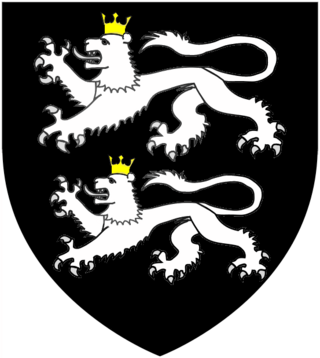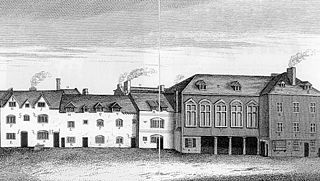
Robert Dymoke, Dymock or Dymocke, of Scrivelsby, Lincolnshire (born 1531; died at Lincoln, England, 11 September 1580) was Queen's Champion of England and a devout Catholic recusant who was named a martyr after his death.

Robert Dymoke, Dymock or Dymocke, of Scrivelsby, Lincolnshire (born 1531; died at Lincoln, England, 11 September 1580) was Queen's Champion of England and a devout Catholic recusant who was named a martyr after his death.
In 1579 Dymoke received the Catholic priest, Richard Kirkman, at his manor of Scrivelsby, and maintained him as a schoolmaster to his sons. He was himself, at the time, an occasional conformist to the Anglican state religion. He was reconciled to the Catholic Church in 1580, either by Kirkman or by Edmund Campion.
In July 1580, Dymoke and his wife were indicted for hearing Mass and for recusancy. He was by then quite helpless owing to paralysis. Dymoke was ordered by Thomas Cooper, Bishop of Lincoln, to be carried off to gaol in Lincoln, where he was visited in his last hours by Protestant ministers, while he was dying there. [1]
He was the son of Sir Edward Dymoke, of Scrivelsby, Lincolnshire (d. 1566), Hereditary King's Champion. The office ran in the Dymoke family, for many centuries.
His wife, whom he married sometime around 1556, Lady Bridget Clinton (born c. 1536), by whom he had ten children, was the eldest daughter and coheiress of Edward Clinton, 1st Earl of Lincoln and Elizabeth Blount. [1]
Elizabeth Blount, commonly known during her lifetime as Bessie Blount, was a mistress of Henry VIII of England.

Edward Fiennes, or Clinton, 1st Earl of Lincoln KG was an English landowner, peer, and Lord High Admiral. He rendered valuable service to four of the Tudor monarchs.

Scrivelsby is a village and ecclesiastical parish in the East Lindsey district of the County of Lincolnshire, England. It is situated 2 miles (3.2 km) south of Horncastle and is on the B1183 road 1 mile (1.6 km) east from the A153 road. It is administered by the civil parish of Mareham on the Hill.

The Honourable The King's Champion is an honorary and hereditary office in the Royal Household of the British sovereign. The champion's original role at the coronation of a British monarch was to challenge anyone who contested the new monarch's entitlement to the throne to trial by combat. Although this function was last enacted at the coronation of George IV in 1821, the office continues to descend through the Dymoke family.

The Dymoke family of the Manor of Scrivelsby in the parish of Horncastle in Lincolnshire holds the feudal hereditary office of King's Champion. The functions of the Champion are to ride into Westminster Hall at the coronation banquet and challenge all comers who might impugn the King's title.
The Dryburne Martyrs: Richard Hill, Richard Holiday, John Hogg and Edmund Duke were English Roman Catholic priests and martyrs, executed at Dryburne, County Durham, in the reign of Elizabeth I. They were beatified by Pope John Paul II in 1987.
William Lacy (Lacey) (died 1582) was an English Catholic priest and martyr. He and fellow priest Richard Kirkman were executed at York on 22 August 1582.
John Bodey was an English Roman Catholic academic jurist and lay theologian. He was martyred in 1583, and beatified in 1929.

James Fenn was an English Catholic priest and martyr who was beatified on 15 December 1929, by Pope Pius XI. James Fenn was the brother of the Catholic priest and writer John Fenn and of Robert Fenn. All three brothers were choristers and scholars.

George Napper (Napier) was an English Roman Catholic priest. He is a Catholic martyr, beatified in 1929 by Pope Pius XI.

Richard Shelley was an English recusant who presented to Elizabeth I of England, or her Parliament, a petition drawn up to request greater religious tolerance for Roman Catholics. The details being disputed, he was imprisoned and died.

Sir John Talbot of Grafton, Worcestershire was a prominent recusant English Catholic layman of the reigns of Elizabeth I of England and James I of England. He was connected by marriage to one of the Gunpowder Plot conspirators, and by acquaintance or family ties to other important Catholic figures. He fell often under suspicion from the English government.
The Rev. Samuel Lodge was the author of Scrivelsby, the Home of the Champions He was a headmaster of Horncastle Grammar School, Lincolnshire, rector for 30 years of Scrivelsby in Lincolnshire, and a Canon of Lincoln Cathedral.

Giles Brydges, 3rd Baron Chandos of Sudeley was an English courtier in the reign of Elizabeth I.
Margaret Dymoke was a lady-in-waiting at the court of Henry VIII of England. Her married names were Vernon, Coffin and Manners. She was born around 1500 in Scrivelsby, Lincolnshire, the daughter of Sir Robert Dymoke of Scrivelsby and Jane Cressner. Her first husband was Richard Vernon of Haddon (d. 1517), by whom she had at least two children. Her second husband was Sir William Coffin, Master of the Horse to Anne Boleyn, the second wife of Henry VIII.
Richard Martin was an English martyr. A layman, Martin was charged with being a "receiver and maintainer of priests" for having bought supper for Robert Morton, a priest.
Henry Clinton, 2nd Earl of Lincoln, KB was an English peer, styled Baron Clinton from 1572 to 1585. Known for repeated accusations of extortion, abduction and arson, among other things, Henry was likely among the most feared and hated noblemen in England during his time as Earl of Lincoln.
Richard Welles, 7th Baron Welles (c.1428–1470), was an English nobleman and soldier. From a Lancastrian family, he came to be on good terms with the Yorkist King Edward IV, but was later executed after being associated with a plot against Edward known as the "Welles Uprising".
Marmion is a surname found in France, Great Britain and Ireland, of Norman-French origin. The origin of the surname itself is disputed.
Dymoke family of the Manor of Scrivelsby in the parish of Horncastle in Lincolnshire, holder of the feudal hereditary office of King's Champion with functions including to ride into Westminster Hall at the coronation banquet, and challenge all comers who might impugn the King's title.